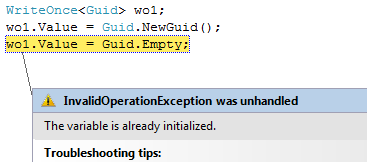Coordination Data Structures – WriteOnce
This is an article in a series of blog entries describing a set of new Coordination Data Structures (CDS) introduced in the June 2008 CTP of the Parallel Extensions for .NET Framework .
In C#, when a field declaration includes a readonly modifier, assignments to the fields introduced by the declaration can only occur as part of the declaration or in a constructor in the same class:
readonly Company _company = new Company();
The assignment window is limited to the constructor or the declaration. In many applications however, it is desirable to have the readonly behaviour (set once and read many times) without this limitation. As you might have guessed, the Parallel Extensions now provides a type (System.Threading.WriteOnce<T>) for this exact purpose.
WriteOnce<T> exposes a Value property that can only be set once. This is obviously done in a thread-safe manner:
// this is a struct, so it will not require an explicit construction
WriteOnce<Guid> wo;
wo.Value = Guid.NewGuid();
As you would expect, attempting to reassign the Value property will throw an exception (“The variable is already initialized”):

WriteOnce<T> is a thread-safe type so if trying to set the Value property concurrently, one of the setters will throw the above exception. In order to avoid this, use the TrySetValue method instead:
WriteOnce<Guid> wo;
if (wo.TrySetValue(Guid.Empty))
{
// the value was set successfuly
}
Attempting to access the Value of a WriteOnce<T> before it has been set invalidates the WriteOnce<T> instance for all future access. The instance will be corrupt and can no longer be accessed for future gets and set.
It corrupts the instance because there is a race condition that leads to a read before the write. Proper synchronization should be used to ensure that this race cannot happen. Therefore always ensure that the value is set before accessing it. When you are not certain if the Value is set, you can access it through the TryGetValue. This will return default(T) if the value is not set and will not corrupt the state of the instance for future use:
Guid val;
if (wo.TryGetValue(out val))
{
// the value has been set previously
}
Please note that WriteOnce<T> is a value type (struct), and as such, you need to be careful about access patterns. If you accidentally make a copy of the struct, you’ll be copying by value meaning that you will be using a replica rather than the original. For example in the code below, both assignments to what might appear as the same WriteOnce instance are allowed. The reality is however that wo1 and wo2 are two different instances:
WriteOnce<Guid> wo1;
Task.Create(
s =>
{
WriteOnce<Guid> wo2 = (WriteOnce<Guid>)s;
// assignment (1)
wo2.Value = Guid.NewGuid();
Console.WriteLine(wo2.Value);
}
, wo1);
// assignment (2)
wo1.Value = Guid.NewGuid();
In the example below however, it will not be possible to assign to wo2.Value (assignment 2 will fail). Although wo2 is a replica copy of wo1, internally it is referencing the same value object assigned in (1) which is not cloned:
WriteOnce<Guid> wo1;
// assignment (1)
wo1.Value = Guid.NewGuid();
Task.Create(
s =>
{
WriteOnce<Guid> wo2 = (WriteOnce<Guid>)s;
// assignment (2)
wo2.Value = Guid.NewGuid();
}
, wo1);
(Thanks to Joe Duffy, Ed Essey and Stephen Toub for their inputs and support)
Comments
- Anonymous
June 02, 2008
PingBack from http://dogs-pets.info/dog-training/?p=997